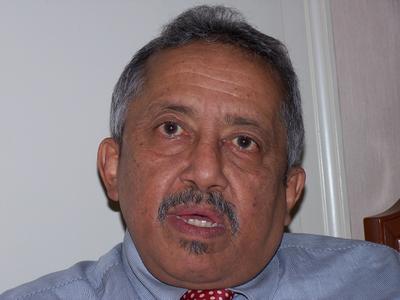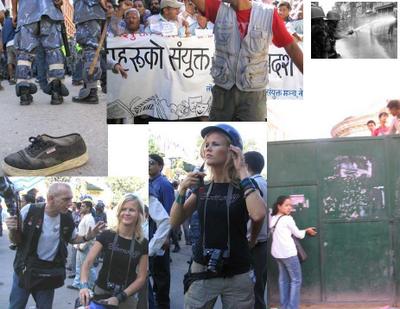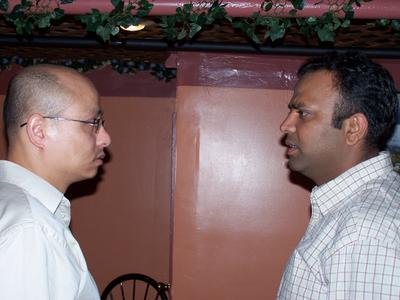

 12 Photos
12 Photos.
I went to bed late, around three in the morning. And I set up my cellphone alarm to go off around 10. But I was woken up by a call from The New Yorker Hotel at 8:30. Bharat Mohanji wanted to confirm about our plans for sightseeing for the day.
I got to the hotel by 11. In the elevator I saw an African man. He had a batch that said Cameroon.
"Are you here for the UN thing?"
"No. I have something else happening right here at this hotel."
Stalin sent people after Trotsky when Trotsky was in Mexico. Perhaps the man was being careful, or perhaps plain truthful.
I called Bharat Mohanji. The machine said "the guest has already checked out." I called up Sudeep in Minnesota to tell him my whereabouts. I guess he had to check out by noon, and one of his relatives was going to pick him up to take to his place.
I called Sharad Chandra Shaha. The call went through. He greeted me in a friendly manner. I told him I was already at the hotel. He invited me over to his hotel room.
He looked different than his file photos used by the various magazines. He was shorter than I had expected, but then someone said that once of Sigmund Freud. Intelligent, expressive people have faces like that.
He was very geneous with his time. He cancelled an appointment he had to be with me longer. And he came down to see me off in the hotel lobby. I greatly appreciated his kindness.
What is he like? He is a dazzling person. He is exceptionally smart, well informed, analytical. If I had to describe him in one word, I would say he is
chaloopurja. I was intently listening to him the entire time. His expansive analysis touched various aspects of national politics, but also US and global politics. I was mighty impressed with some of the things he had to say.
This is an able person.
On the way down in the elevator he remarked he had attended the University Of Pittsburgh in 1972. I was pleasantly surprised. I did not know that about him. I have not read that about him in any Nepali magazine. He said he had been to the US numerous times.
He invited me to come meet him the next time I was in Kathmandu. I readily accepted the invitation. And happily so. Shaha is a very interesting person, someone you want to spend time with, shoot the breeze with. I would have wanted to spend more time with him today itself, but I did not want him to cancel any more of his programs. He had a packed schedule of events. Like a diligent student, he was going to attend all or most of the seminars he was scheduled to attend. That attitude scores points.
I was honest with him in what I had to say. I told him I was part of the September 16 protest rally. But then I also told him I had planned on meeting the king if he had come, which was not a popular position among my democrat friends. I told him my goal is peace through dialogue, and that I was very thankful to him for his time.
He said he was not in the king's inner circle of advisors, although he has known the king a long time. He heard about 2/1 on the radio. Even now, he is focued on his information technology commission. He is not in the same league as Sachit Samsher Rana and Bharat Keshar Singh. They have the king's ears.
But the impression I have had for the longest time is the king is his own advisor.
Shaha and I agreed on many things.
- It was not the king who dissolved the parliament in 2002.
- There is nothing in the constitution that would allow the king to revive the parliament. To that I added the UML does not want the parliament revived with the use of Article 127 in the first place.
He really helped me get into the king's mind, step by step. Why he took step 1, then step 2, and so on. Shaha was frank about 2/1. As to whether or not that was the right thing to do, I don't know. That is an open question, he said.
Shaha started out by saying the king and the monarchists are for a Constituent Assembly. When I pressed him on that point, he backtracked a little. I said, so you are saying the king is for a constituent assembly, the only disagreement is as to who will conduct it, under what circumstances, right? We both agreed the country can not go for a Constituent Assembly with the Maoists still having a standing army.
But then he navigated towards the other end of the Monarchist spectrum. He said it is not that obvious the people want a Constituent Assembly. We can not only listen to the few who venture out into the streets, we also have to listen to the many who stay home. And the king has many advisors who do not want a Constituent Assembly at all: the king has to listen to them also. There are some who think the monarchy will come to an end should the country be taken through such an Assembly. What is an Assembly anyways but a fancy name for a parliament?
I am not surprised. He gave me a full view of the monarchist thinking on the Constituent Assembly question. But he also gave me glimpses that the king can possibly come around to the idea of a Constituent Assembly. I told him the monarchy will be retained through a Constituent Assembly, but such an Assembly will disarm the Maoists.
He gave me his contact information, including his mobile number in Kathmandu. I might need that down the line.
He also gave more credit to India than might be due. Delhi is a regional power center, like the king is in Nepal. The king is at the center of many conspiracy theories in Nepal, India is at the center of many in South Asia.
Do I buy that India is funding the Maoists to use them against Nepal? No way. India is after Ganapathy too. They can't find Ganapathy.
Prachanda, Baburam, Mahara, they all are in Delhi. That was Shaha's firm conviction.
"If Prachanda was anywhere in Nepal, don't you think we would have caught him by now?"
But he was also subtle about the India angle. It is possible the intelligence people and the foreign ministry people are going their own separate ways, he said.
The king is for constitutional monarchy and multi-party democracy. He reiterated that. Is the king double-talking? As in, pay lip service to democracy, but lay grounds for an absolute monarchy?
Only a few days earlier there were rumors about martial law. I don't think the king is thinking martial law. He is thinking municipal polls. Shaha and I talked about the polls also. If the seven party movement can not catch the imagination of the masses, and if the king can ensure the safety of the voters, and if there are UN observers, and the voting percentage for the polls is something like 60%, then is that a democratic enough exercise? That is an important question to the democrats who refuse to do basic political homework.
In short, Sharad Chandra Shaha is an impressive person who really helped me look into the monarchist mindset. I came out with a firm belief it is possible to do business with the king and his men. If the Maoists deserve our benefit of doubt, so do the king and his men. Besides, how many better options do we have?
An aversion to dialogue I find bewildering. Dialogue is how peace is made. Dialogue is the way to do political work.
I think we should work to bring the king and his men around to the idea of a Constituent Assembly. That is the way out. How do you do that?
Step 1 is a willingness for dialogue. Why am I having to state such an obvious thing?
On the other hand, if the Supreme Court were to revive the house, that automatically brings the ball back to the democratic court. Then things flow smooth from there on.
Shaha also briefly touched upon how the RCCC does not seem to be faring well at the Supreme Court. He was surprisingly objective about it.
Then I briefly met up with Chand in the lobby. I handed him the document. We agreed to meet again some other time.
I also handed a hard copy to Shaha. He said he will look at it at the earliest, which will probably be in the plane on his way back to Kathmandu, and that he will email me his feedback.
There was this little incident as we left his hotel room.
The maid had come for the daily cleanup. She asked Shaha to move something on the table from one end to another. It was a white, black, foreigner moment. In America both Sharad Chandra Shaha and Paramendra Bhagat are Madhesi. Nelson Mandela talks of "a thousand little indignities."
"She would have done it herself if I were not there!" Shaha said indignantly.
Some people ask me why I don't go back to Nepal. There is work to do here too. That's why.
6:38 PM Addendum
I just got Bharat Mohanji's new phone number. He is now in Jackson Heights at a relative's place. The document got left in the hotel room by mistake. He has requested I bring another copy when I go see him tomorrow morning. He said he might have more time for it when he is in Minnesota for a few weeks. But that we might talk about it for a half hour tomorrow itself.
In The News - Opposition parties condemn police action, vow to intensify stir NepalNews
- Pro-Maoist students propose to work with other student bodies
- Over 500 arrested from seven-party protests in Kathmandu
- Maoists kill civilian, abduct over 200
- Writ demands ban on use of teargas
- Hearings on RCCC case continue, court orders release of Parajuli
- Police arrest district president of Nepal Bar in Syangja
- Royal Palace refutes news report
- ICRC urges for safe environment for the release of RNA personnel
- SC fiat to govt on UN pact, CIAA chief’s case
- Challenges after the Ceasefire
- What is teargas?
- More than 300 democracy protesters arrested in Nepal; dozens ... CBC News, Canada
- For pro-democracy leanings, Nepal's No. 2 envoy in Delhi recalled ... Newindpress
- 600 arrested in anti-king demonstrations in Nepal Rediff, India
- Over 600 arrested, massive protests rock Kathmandu Malayala Manorama
- Police hold 500 Nepal protesters BBC News, UK
- Maoist’s Latest Unilateral Truce Heralds A New Era In Nepali ... Global Politician
- NEPAL: Still low on global poverty index Reuters AlertNet, UK
- Massive protests rock Kathmandu Indian Express, India
- Nepal invites UN observers to monitor Municipal polls Hindustan Times
- Face to face, with Maoist leader Prachanda Times of India, India




















